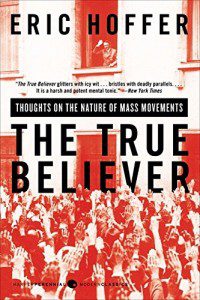
Probably the thing that bugs me most about those tender sprouts who have grown up in the hermetically sealed safe-spaces of the upper-middle class is the paradoxical blend of blithe knowingness and naiveté.
Here are people who’ve spent their entire lives in controlled environments. Even those programs designed to provide exposure to the world outside the bubble suffer from being what they are–programs–with oversight, learning outcomes, itineraries, daily schedules, matching water bottles, and plenty of liability insurance.
And yet, for all the padding, there is sureness of conviction. These are people who know what is wrong with the world and they’re determined to fix it.
It generally takes me all of ten minutes to burst their bubbles. I don’t say mean things. I just ask questions, like Socrates. Sometimes I even suggest alternative explanations to their knowing-answers.
I’ve had more opportunities to do this lately. The Trump phenomenon, you know.
It really doesn’t matter which side of the political divide the subject is on, if the person grew up in the upper middle class, he or she is sure there is no sane reason a person would support the New York billionaire. It all comes down to either racism, xenophobia, or the manipulations of a demagogue. (Probably all the above.)
My first question is, where did you grow up? (They don’t see the point of that.) Then I ask, where did you go to school? (Here the defenses begin to go up.) By the time I get to employment; for example, have you ever worked with your hands? people begin to get a little angry. When I ask, do you know any Trump supporters who you respect, or even admire? now the contempt begins to show. (No, no they do not, what a stupid question.)
I’m not really interested in defending Trump here. What I’m really interested in is bubbles. The thing about bubbles is their transparency; they can surround us, and insulate us, and all the while we remain oblivious to them.
Recently Charles Murray’s bubble test has been making the rounds. It’s designed to help bubble-encased people detect the bubbles that surround them, like mimes in a park. It’s pretty good, (Go ahead and take it.)
I scored 70, btw. I have yet to compared my score with someone who scored higher. If my tastes in television were different my score would have been higher–some bubbles aren’t all bad.
Some of the dumbest people I know have PhDs.
I’m an odd duck. I come from a family filled with intellectuals and artists. Yet as a kid I lived in a housing project, spent time in a foster home, and saw my mother trucked off to mental institutions. As a young man I was a framer and a home improvement contractor. I’ve lived in Cambridge, Massachusetts (smack dab between Harvard and MIT), spent some time at Harvard Divinity School, taught philosophy to undergraduates, and even spent more time than I care to recall around the sort of people who think Bernie Sanders is the hope of the ages (they used to feel that way about Obama, but they don’t like to be reminded of that).
I’ve lived something of an unstructured existence. To this day I have friends who call themselves rednecks, others who teach at elite colleges, still others on welfare, and plenty who live in cul-de-sac in tony towns. I never set out to know people from such a wide range of backgrounds, ethnicities, social classes, and lifestyles. It just turned out that way.
And I can say this with some authority, some of the best educated people I know are phenomenally stupid.
And their stupidity seems to rise with their confidence that they really know the score.
I think it comes down to a couple of things. One, they’ve never really gotten Socrates’s point about wisdom beginning with an admission of ignorance. These are people who are deathly afraid of ever admitting they don’t know something.
The other thing is the bubble.

Blue Collar Intellectuals
I think people got out of their bubbles more in the past–probably not the distant past, but definitely during the 19th and 20th centuries.
I just finished reading, Blue Collar Intellectuals by Daniel J. Flynn. It’s a series of biographical sketches of five “blue collar” intellectuals. Here’s the list: Will and Ariel Durant, Mortimer Adler, Milton Friedman, Eric Hoffer, and Ray Bradbury.
Each rose from a humble, working class background and went on to pursue the life of the mind. In each case their sentiments remained sympathetic to blue collar people. They wanted to engage in uplift, and spread learning among the illiterati. This, unsurprisingly, but disappointingly, earned them the contempt of literati.
My favorite of the bunch was Eric Hoffer (with Ray Bradbury a close second). Hoffer was a San Francisco longshoreman. He spent nearly his entire working life as one of the working class, but in the evenings he wrote slim but profound social analysis. His best known book is, The True Believer. I’d heard of it, but had not read it. After reading about him, I picked it up and I’m working through it.
Hoffer has never been picked up by the left, mainly because he saw through leftists with the eye of a true blue collar intellectual. Here’s an extract from a marvelous interview of Hoffer from 1967. (I love the chain-smoking.)
“Whenever intellectuals are in power there is total raping going on.”
Strong stuff. But I think he’s right.
Have you wondered why the people Bernie Sanders ostensibly speaks for are more likely to support Trump, billionaire status and all? Hoffer sums it up. Anyway, I encourage you to listen to whole interview on Youtube. This is just a sample.
I wish we had some blue collar public intellectuals today. Perhaps we do and I don’t know who they are. But there you go, back in the day many people could identify them.
Bubble-babies for Jesus
I suppose the biggest thing that bugs me as a minister is the bubble-factor among ministers. We have all these bright good doobies, huffing and puffing, with their neat little theological answer books, their soft-hands, tender hearts, and blinkered expressions. They’ve been on mission trips to Haiti, they’ve taken classes on social justice in seminary–and increasingly Bible college, they wring their hands about domestic violence and gender equality.
But all the sympathy is based on second-hand, manufactured, pseudo-experience. They don’t really know anything, and frankly I just wish they’d shut up.
Here’s the straight truth. Once a bubble-baby, always a bubble-baby. Our sympathies form in childhood. And we can detect those sympathies by thousands of subtle clues: clothing, body language, accents, tastes, and so forth. Bubble-babies tend to cluster, just like every other group. But unlike other groups, they presume to know the truth about the rest of us, and their contempt is getting worse.
I think our only hope lies in humility. Unfortunately the bubble-babies live in a curved structure that only affirms what is already present inside the worlds they inhabit. And like hamsters in plastic exercise balls they’re running over the rest of us.












